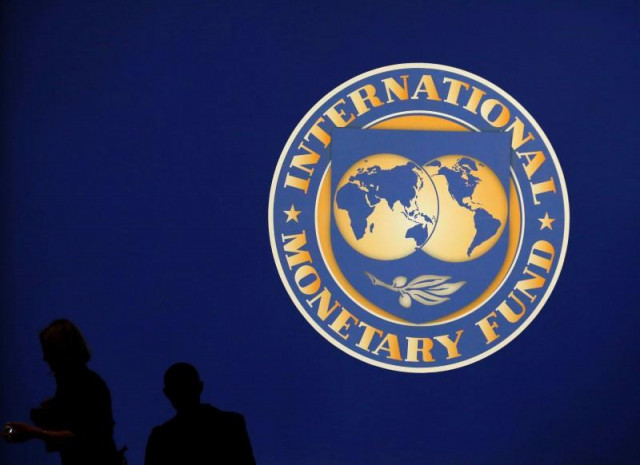Bailout talks with IMF far from conclusion
Global lender seeks monetary tightening, elimination of circular debt flow from first year of programme

PHOTO: REUTERS
Pakistani and IMF officials held a first face-off plenary meeting on Wednesday in which all key policy areas were discussed.
The Pakistani side was led by Adviser to the Prime Minister on Finance Dr Abdul Hafeez Shaikh. The IMF delegation was headed by its Mission Chief Ernesto Rigo.
The Pakistani delegation briefed the IMF team on the current economic situation and reforms that the government had introduced.
Speaking after the meeting, the adviser said talks would continue in the coming days.
The IMF staff-level team is in the country from April 29 to May 10 with an aim to finalise the three-year Extended Fund Facility programme, valuing nearly $6.5 billion.
Without an IMF umbrella, Pakistan's external sector position remains extremely fragile. The deal with the IMF will open doors for borrowings from the World Bank, the Asian Development Bank and launch of sovereign bonds.
On his return from Washington last month, former finance minister Asad Umar said Pakistan and the IMF had reached an agreement in principle and the technical details would be finalised during the visit of the global lender's team to the country.
But finance ministry sources said both sides still had differences over the monetary policy, the phasing out of electricity subsidies, the upfront taxation measures and the federal government's expenditures.
The government has so far appeared reluctant to substantially increase the electricity prices and slap taxes worth over Rs600 billion – apparently an unrealistic demand.
The successful resolution of these issues along with an agreement on the monetary stance can pave the way for the staff-level deal by May 10, the sources said.
The Pakistani authorities had earlier given the impression that the IMF had withdrawn from its demand of further increase in the interest rate before the approval of the loan package by its executive board.
The sources said the issue was yet to be settled as the IMF wanted the rate further jacked up.
The State Bank of Pakistan has already increased the key discount rate to 10.75%, although the finance ministry had reservations on the last two policy rate hikes.
The Pakistani authorities are of the view that the monetary policy should not be seen in the light of short-term fluctuation in the inflation index.
The government is willing to keep the interest rate positive but it did not want to peg it with monthly movements in the core inflation index, the sources said.
They added that previous hikes in the discount rates coupled with the 35% currency devaluation had adversely affected economic growth besides causing a spike in inflation. The government's cost-of-debt servicing has also substantially increased because of the hike in electricity prices.
Another key IMF demand is that Pakistan should eliminate the flow of circular debt from the first year of the global lender's programme.
By the end of this fiscal year, the Pakistan Tehreek-e-Insaf (PTI) government will add over Rs325 billion to the already pending stock of circular debt -- a figure that the IMF is seeking to be brought to zero by the end of the fiscal year 2019-20, the sources said.
Against the IMF demand, the government has presented a two-year plan to completely eliminate the circular debt, starting from July 2019 to June 2021, they added. Under this plan, the flow of the circular debt will come down to slightly over Rs200 billion at the end of the next fiscal year and stand at Rs93 billion for the fiscal year 2020-21. From July 2021, the circular debt will be completely eliminated.
The sources said the IMF was of the view that if the government could not fully eliminate the circular debt in the first year then it should fully reflect its fiscal implications in the budget.
However, this will squeeze the government's spending space in other areas, as the IMF will not like to relax the overall ceiling of the budget deficit, they added.
The energy ministry's stance is that the proposal to increase the electricity tariff will be counterproductive. The government has launched a campaign against electricity theft and low recovery of bills.
A substantial increase in electricity tariff may discourage people from complying with the law.
During the past four months, the recovery of electricity bills has improved by an additional Rs51 billion.
The energy ministry has assured the IMF that it would facilitate quarterly adjustments in electricity prices but it was not in favour of full cost recovery in one go.
The ministry has developed a three-year plan for targeting the tariff differential subsidies and bringing the tariff to a cost-recovery level, along with cost-cutting and efficiency measures to reach full cost recovery in the electricity sector.
The gas and electricity tariffs have already been increased to move towards full cost recovery and curtail the build-up of circular debt, the sources said.
The tariff for the consumption of up to 200 units per month is planned to be retained. The subsidies for consumption exceeding 200 units will be phased out from the second year of the programme.
The government has also informed the IMF that it would recover the cost of servicing for the syndicated term credit finance facility from electricity consumers.



















COMMENTS
Comments are moderated and generally will be posted if they are on-topic and not abusive.
For more information, please see our Comments FAQ